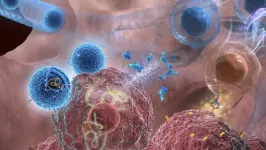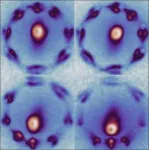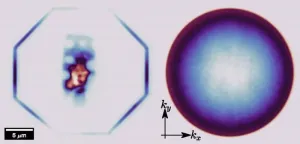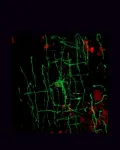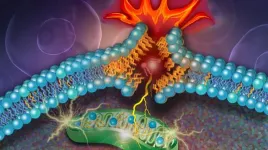(Press-News.org) Lung cancer is one of the most common cancers and has one of the lowest survival rates in the world. Cytokines, which are small signaling proteins, such as interleukin-12 (IL-12), have demonstrated considerable potential as robust tumor suppressors. However, their applications are limited due to a multitude of severe side effects.
In a paper published Jan. 11 by Nature Nanotechnology, Biomedical Engineering Professor Ke Cheng and his research group demonstrate that using nanobubbles, called exosomes, through an inhalation treatment method can directly deliver IL-12 messenger RNA (mRNA) to the lungs. mRNAs are the blueprints for producing specific proteins that participate in a variety of cellular functions. While scientists have previously used liposomes (tiny fat-based particles) or lipid nanoparticles (LNPs) to deliver mRNA, this method has several problems, including a lack of tissue homing, where the particles do not go to the target organs, and concerns about the potential toxicity after long-term exposure. Over the past 15 years, Cheng’s group has been developing exosomes for use as superior drug delivery carriers over liposomes and LNPs in specific indications.
New approach
Up to now, clinicians have only been able to use IL-12 to treat cancer by injecting it directly into the tumor or into the bloodstream. Cheng’s lab found that having the patient -- in this case, mice -- inhale IL-12 mRNA in exosomes could not only deliver locally concentrated IL-12 into the lungs but also could better fight the cancer with minimal side effects. The inhalation method is more efficient in building higher concentrations of IL-12 right where it is needed than other ways of delivering mRNA such as using liposomes.
"Exosomes are usually injected systemically into the bloodstream,” said Cheng. “In this new study, we show that inhaled exosomes can efficiently reach the lung and deliver an anti-lung cancer cargo, IL-12 mRNA. This is a major step forward in advancing the development of new inhalable drugs to treat lung cancer, which has one of the lowest five-year survival rates in the world."
Turning immune cells into powerful defenders
Inhaling the nanobubbles with the IL-12 blueprint can kickstart the lung immune cells, turning them into powerful defenders equipped to release substances that directly target and destroy tumor cells. In addition, IL-12 helps train these immune cells to “remember” the unique features of tumor cells. As a result, if the tumor tries to attack again, these well-informed immune cells are ready to recognize and eliminate the tumor swiftly. Additionally, these supercharged immune cells can spread their newfound knowledge to other, untrained immune cells throughout the body, creating an army of defenders. This means that even if tumor cells try to spread beyond their original location, like the lungs, these prepared immune cells can spot and wipe them out, offering a body-wide defense system against cancer.The mice that inhaled this therapy demonstrated lung tumor suppression as well as heightened resistance against tumor rechallenges.
Combining efficacy with simplicity
This strategy stands out as a potent IL-12 mRNA delivery system to the lung microenvironment, say the researchers, and combines simplicity with efficacy against primary tumors and metastases. Compared to other nanoparticle controls, exosomes boost IL-12 expression with mitigated toxicity. And patients are likely to be much happier with simply inhaling the therapeutic rather than receiving intratumoral injections.
Next steps
Cheng’s group is now working with Columbia University Irving Medical Center oncologists to translate their results into the clinic to benefit lung cancer patients.
END
Study finds new inhalable therapy is a big step forward in lung cancer research
2024-02-15
ELSE PRESS RELEASES FROM THIS DATE:
Damon Runyon Cancer Research Foundation awards $3.2 million to innovative early-career scientists
2024-02-15
The Damon Runyon Cancer Research Foundation has announced eight recipients of the 2024 Damon Runyon-Rachleff Innovation Award, established to support “high-risk, high-reward” ideas with the potential to significantly impact the prevention, diagnosis, or treatment of cancer. Five extraordinary early-career researchers will receive initial grants of $400,000 over two years, and each will have the opportunity to receive two additional years of funding (for a potential total of $800,000). This year, this “Stage 2” continuation ...
Scientific report reveals livestock as the key factor in cheatgrass spread
2024-02-15
For Immediate Release
Contact: Erik Molvar, Western Watersheds Project, 307-399-7910
Roger Rosentreter, Bureau of Land Management, Botanist (Retired), 208-991-8815
Don Mansfield, Emeritus Professor of Biology, College of Idaho, 208-871-8170
Scientific Report Reveals Livestock Grazing as the Key Factor in Cheatgrass Spread
HAILEY, Ida. (February 15, 2024) – A scientific report released today illuminates the causes of cheatgrass spread and compares the effectiveness ...
NRL discovers two-dimensional waveguides
2024-02-15
WASHINGTON – The U.S. Naval Research Laboratory (NRL), in collaboration with Kansas State University, announce the discovery of slab waveguides based on the two-dimensional material hexagonal boron nitride. This milestone has been reported in the journal Advanced Materials.
Two-dimensional (2D) materials are a class of materials which can be reduced to the monolayer limit by mechanically peeling the layers apart. The weak interlayer attractions, or van der Waals attraction, allows the layers to be separated via the so-called ...
AIBS names 2024 emerging public policy leaders
2024-02-15
The American Institute of Biological Sciences (AIBS) is pleased to announce that Alex Rich and Efraín Rodríguez-Ocasio have been selected to receive the 2024 AIBS Emerging Public Policy Leadership Award (EPPLA). The award recognizes graduate students in the biological sciences who have demonstrated leadership skills and an aptitude for working at the intersection of science and public policy.
Alex Rich is a Ph.D. student in neuroscience at Yale University in New Haven, Connecticut. Her research focuses on decision-making and disordered ...
Shuffling the deck for privacy
2024-02-15
By integrating an ensemble of privacy-preserving algorithms, a KAUST research team has developed a machine-learning approach that addresses a significant challenge in medical research: How to use the power of artificial intelligence (AI) to accelerate discovery from genomic data while protecting the privacy of individuals.[1]
“Omics data usually contains a lot of private information, such as gene expression and cell composition, which could often be related to a person’s disease or health status,” says KAUST’s Xin Gao. “AI models trained on this data – particularly deep learning models – have the potential to retain private ...
Root microbes may be the secret to a better tasting cup of tea
2024-02-15
You’d think the complex flavor in a quality cup of tea would depend mainly on the tea varieties used to make it. But a study appearing in the journal Current Biology on February 15 shows that the making of a delicious cup of tea depends on another key ingredient: the collection of microbes found on tea roots. By altering that assemblage, the authors showed that they could make good-quality tea even better.
“Significant disparities in microbial communities, particularly nitrogen metabolism-related microorganisms, were identified in the roots of tea plants with varying qualities through ...
Winners of 4th annual Rising Black Scientists Awards announced
2024-02-15
Cell Press, Cell Signaling Technology (CST), and the Elsevier Foundation are proud to announce the winners of the 4th annual Rising Black Scientists Awards: Jaye Wilson of Yale University, Kevin Brown Jr. of California State University San Marcos, Senegal Mabry of Cornell University, and Akorfa Dagadu of the Massachusetts Institute of Technology.
This year had the greatest number of submissions thus far, with the winners being selected from a pool of more than 350 applicants from across the life, health, physical, earth, environmental, and data sciences. Essays from the winners and honorees appear in the journals Cell and ...
Ancient retroviruses played a key role in the evolution of vertebrate brains
2024-02-15
Researchers report February 15 in the journal Cell that ancient viruses may be to thank for myelin—and, by extension, our large, complex brains. The team found that a retrovirus-derived genetic element or “retrotransposon” is essential for myelin production in mammals, amphibians, and fish. The gene sequence, which they dubbed “RetroMyelin,” is likely a result of ancient viral infection, and comparisons of RetroMyelin in mammals, amphibians, and fish suggest that retroviral infection and genome-invasion ...
Researchers discover that a rare fat molecule helps drive cell death
2024-02-15
Columbia researchers have found that a rare type of lipid is a key driver of ferroptosis, a form of cell death discovered by Columbia professor Brent Stockwell.
The findings provide new detail on how cells die during ferroptosis and could improve understanding of how to stop ferroptosis in contexts where it is harmfully occurring– in neurodegenerative diseases, for example– or induce it in contexts where it could be useful, such as using it to kill dangerous cancer cells.
The new research found that a rare type of ...
Plant disease: Mapping the spread of potato blight prior to the Irish potato famine *IMAGES*
2024-02-15
The first accurate maps of outbreaks of potato blight — a disease caused by the fungus-like pathogen Phytophthora infestans that was responsible for the Irish potato famine between 1845 and 1852 — in the USA between 1843 and 1845 are presented in a study published in Scientific Reports. The findings improve our understanding of the spread of potato blight before the disease reached Europe.
Jean Ristaino and colleagues mapped outbreaks of potato blight in North America between 1843 and 1845 by analysing historic agricultural reports published in the USA during this period. The authors found that the disease was first reported ...
